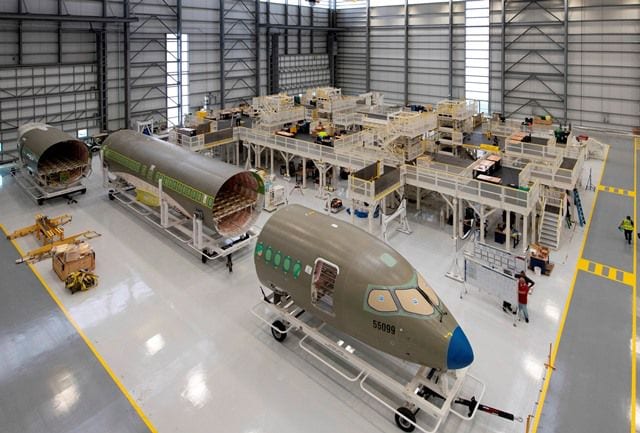
The new agreement established between the European Union and U.S. will suspend tariffs enacted by both sides as part of a 17-year dispute over government subsidies on aircraft production, including the Airbus A220 facility located in Mobile, Alabama, pictured here. (Airbus)
Under a new agreement between European Union (EU) and United States (U.S.) officials announced on June 15, tariffs on large aircraft parts and components have been suspended by both sides for a period of five years that resolves a 17-year trade dispute involving Airbus and Boeing.
According to the cooperative framework published by the Office of the United States Trade Representative (USTR), a key provision within the new agreement is that both sides will be subjected to a more open and transparent process in the way that they provide government funding in support of research and development of new aircraft programs and technologies developed by Airbus and Boeing.
“Each side intends to provide any funding for research and development (R&D) for large civil aircraft to its [Large Civil Aircraft] LCA producer through an open and transparent process and intends to make the results of fully government-funded R&D widely available, to the extent permitted by law,” the framework reads. “Each side intends not to provide R&D funding or other support that is specific to its LCA producer in a way that would cause negative effects to the other side.”
A working group established by the new agreement will meet “upon request” twice a year, according to the agreement, and will serve as a bilateral resolution board when disputes arise between the two sides. There will also be an effort by the working group to analyze the “non-market practice of third parties that may harm their respective large civil aircraft industries.”
A statement on the agreement published by the European Commission valued the total of the suspended tariffs at $11.5 billion.
“With this agreement, we are grounding the Airbus-Boeing dispute. It proves that the transatlantic relationship is now moving to the next level and that we can work with the US on tackling long-running disputes,” European Commission Executive Vice-President Valdis Dombrovskis said in a statement. “We now have time and space to find a lasting solution through our new Working Group on Aircraft, while saving billions of euros in duties for importers on both sides of the Atlantic.”
The dispute originally began in 2004, after a World Trade Organization (WTO) case filed by the U.S. against the EU claiming that Airbus was being illegally subsidized by the EU. A follow-up WTO complaint against the U.S. was filed by the EU the next year, kicking off the tariff battle between the two sides.
In 2019, the feud was reignited by WTO Large Civil Aircraft litigation which involved EU subsidies equaling $7.5 billion annually, according to the USTR. The U.S. determined they were denied rights under the WTO Agreement and placed additional duties on products from certain EU member states in Oct. 2019.
The tariff battle escalated in January when new tariffs were enacted by USTR on fuselages and fuselage sections, wings and wing assemblies, and horizontal and vertical stabilizers in response to tariffs enacted by the EU in November 2020.
“After years of bitter litigation and weeks of intense diplomacy, we have reached a deal on a set of high-level principles that resets U.S.-EU engagement in the large civil aircraft industry,” U.S. Ambassador Katherine Tai said in a statement.
Boeing released a statement welcoming the new agreement, describing it as a path toward ensuring that all future government support for commercial aircraft production is “provided on market terms.”
“The understanding reached today commits the EU to addressing launch aid, and leaves in place the necessary rules to ensure that the EU and United States live up to that commitment, without requiring further WTO action. Boeing will fully support the U.S. Government’s efforts to ensure that the principles in this understanding are respected,” Boeing said in the statement.